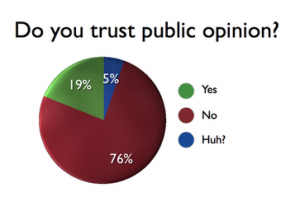 The poll below is an interesting one. (The bogus one to the left is only fun, but not interesting.) As I write this post, it is still current, and is available for voting at the upper right of the main blog page.
The poll below is an interesting one. (The bogus one to the left is only fun, but not interesting.) As I write this post, it is still current, and is available for voting at the upper right of the main blog page.
Which of these is false?
- The Christian God is a self.
- The Christian God is the Trinity.
- The Trinity is not a self.
One option is to vote that none are false, since all are true. As I write this, 27% have picked this option. But this is a poor pick. This “is” here is the “is” of numerical identity throughout. Given this, it is impossible that all three be true; they are demonstrably inconsistent. (The logical form is: 1. g=s, 2. g=t, 3. -(t=s).) At least one must be false.
- If 1 & 2, then not-3. If this God is a self, and is the Trinity, and it must be false that the Trinity is not a self.
- If 1 & 3 then not-2. If God’s a self, and the Trinity isn’t, then it must be false that God just is the Trinity.
- If 2 & 3 then not-1. If God’s the Trinity, but is not a self, then it is false that the Christian God is a self.
Why then do 27% opt for inconsistency (affirming all three)? I’m not sure.
- It could simply be desire for orthodoxy being stronger than the desire to avoid believing falsehoods.
- Or perhaps some imagine that “human logic” can be ignored; inconsistent claims may each be true, at least about God.
- Maybe it’s clinging to the mysterian hope that this must be a merely apparent contradiction, though no one can make that appearance recede.
- Or perhaps they’re misreading 1, as if it said only that the Christian God is personal – not a self, but somehow self-like or closely related to at least one self. (Compare: being a king vs. being kingly.) If this is the case, then when tutored on how “is” is meant here, such folk should probably pick another option. To avoid this confusion, we could rephrase the inconsistent triad thusly:
- The Christian God is a certain self.
- The Christian God is the Trinity.
- The Trinity is not any self.
This triad has a different logical form (1. Ex (x=g & Sx) 2. g = t, 3. -Ex(x=t & Sx)), but the three are still demonstrably inconsistent. It’s just that the proof is harder. I think this is actually a better way to formulate the inconsistent triad. (Reading the logic I just gave: 1. There exists some x which just is God and which is a self. 2. God just is the Trinity. 3. It’s not the case that there exists some x such that it just is the Trinity and it’s a self.)
Let’s run through the other options briefly. I list the poll percentages as of the writing of this post.
- If you deny 1 (29%), you’re probably some sort of “social” trinitarian. You think God is a group, a community, communion, a quasi-family, consisting of three divine selves.
- If you deny 3 (11%), you’re probably some sort of modalist. You think that God, that is, the Trinity, has a first-person point of view. He’s a self all right, though he operates in three different ways, as Father, Son, and Spirit, or maybe Creator, Redeemer, Sanctifier. He’s group-like perhaps, but is not literally a group. He’s a god, and the only god.
- If you deny 2 (33%), you’re probably some sort of unitarian. You think the one god is the Father, and that the Trinity isn’t a god, but is rather God, God’s Son, and God’s Spirit.
And since one can always tell what is true by consulting simple, tiny-sample internet polls, this shows that unitarianism is true… today. 
The post Comment on a Poll – an inconsistent triad appeared first on Trinities.